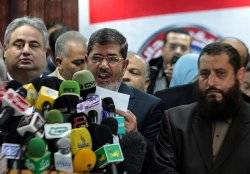The Freedom and Justice Party (FJP), which represents Egypt's Muslim Brotherhood, has won 47 per cent of all seats in the country's election for the lower house of parliament, the election commission has said.
The FJP won 235 seats in the new People's Assembly, Abdel Moez Ibrahim, the head of the country's election commission, announced on Saturday.
It also secured 127 seats on party lists, while its candidates won another 108 in first-past-the-post constituency votes, where votes were cast for individual candidates.
The Islamist al-Nour party has won 24 per cent of all seats on offer.
The liberal al-Wafd party won about seven per cent of the seats, according to the latest results. The remaining 22 per cent of seats were split amongst smaller political parties.
The election commission says that voter turnout was 54 per cent in the polls.
The FJP has named Saad al-Katatni, a leading Muslim Brotherhood official who has previously sat in parliament as an independent, as speaker of the assembly.
Katatni has told the Reuters news agency that he intends for the role of the assembly to be "reconciliatory".
"The priorities are meeting the demands of the revolution, including the rights of the injured and those killed in the uprising," he said.
New constitution
The landmark elections for the lower house of parliament, held in three stages, were the first since the fall of Hosni Mubarak, who was overthrown as president by a popular uprising in January last year.
Two-thirds of the 498 seats up for election were reserved for those belonging to registered political parties [referred to as 'closed party lists'], while the remaining one-third of seats were contested by individuals.
Ten seats were reserved for appointees of the Supreme Council of the Armed Forces (SCAF), the military council that has been ruling Egypt since Mubarak fell.
"This parliament, that has its opening session on Monday, has very limited powers," reported Al Jazeera's Sherine Tadros from Cairo, the Egyptian capital.
"The most important thing that it will be doing in the coming weeks and months, is setting up a 100-member body that will then write the constitution."
Elections for the upper house of parliament will be held in February, after which the constituent assembly will be chosen.
A new president is to be elected by June under a timetable decided by the SCAF. Candidates can register for that election by April 15.
Detainees freed
In a separate development, Field Marshal Hussein Tantawi, the head of SCAF, ordered the release on Saturday of 1,959 people being held in prisons after having faced military trials.
"It is the biggest pardon since the ouster of then President Hosni Mubarak. All of these people were incarcerated after the SCAF took over and they subjected about 12,000 people to military trials since then," reported Al Jazeera's Sherine Tadros from Cairo.
"Most of those who are incarcerated and are now being pardoned, are mainly in there for cases to do with rioting, attacking public buildings and so on. There has been a lot of talk about military trials. There's a big movement here to try and get rid of these military trials, people saying that they violate human rights."
Maikel Nabil, a prominent blogger who was convicted of insulting the military and sentenced to two years in jail, was among those ordered to be released.
"[Nabil was] the first blogger to be incarcerated by military trial back in April ... and he was against the military and he spoke out against the military and wrote about the military and his case very much resonated across the country at that time because it ... fed into this idea that the country was just going back to its old ways," said Tadros.
"All of this coming just a few days before the first anniversary of the revolution, January 25. SCAF is very adamant to make this a day of celebration, whereas others are trying to make it into a day of demonstration."
PHOTO CAPTION
Muslim Brotherhood member and Freedom and Justice Party chairman Mohammed Morsy (C) speaks at a press conference in Cairo on January 16, 2012.
Al-Jazeera

 Hajj virtues
Hajj virtues